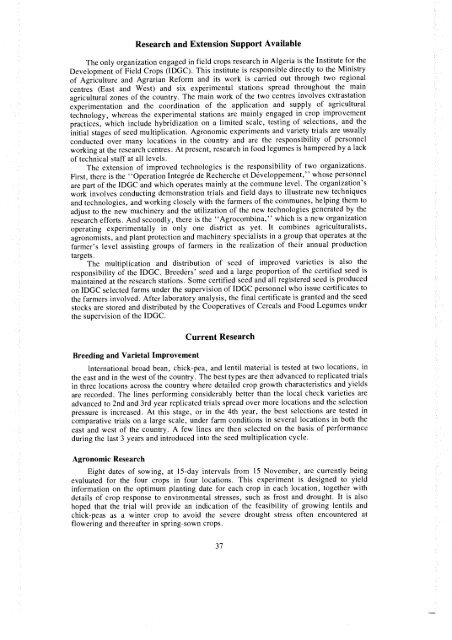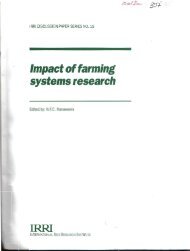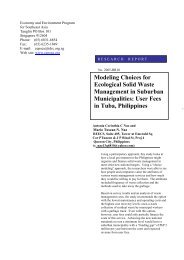I ARCHIV - International Development Research Centre
I ARCHIV - International Development Research Centre
I ARCHIV - International Development Research Centre
- No tags were found...
You also want an ePaper? Increase the reach of your titles
YUMPU automatically turns print PDFs into web optimized ePapers that Google loves.
<strong>Research</strong> and Extension Support Available<br />
The only organization engaged in field crops research in Algeria is the Institute for the<br />
<strong>Development</strong> of Field Crops (IDGC). This institute is responsible directly to the Ministry<br />
of Agriculture and Agrarian Reform and its work is carried out through two regional<br />
centres (East and West) and six experimental stations spread throughout the main<br />
agricultural zones of the country. The main work of the two centres involves extrastation<br />
experimentation and the coordination of the application and supply of agricultural<br />
technology, whereas the experimental stations are mainly engaged in crop improvement<br />
practices, which include hybridization on a limited scale, testing of selections, and the<br />
initial stages of seed multiplication. Agronomic experiments and variety trials are usually<br />
conducted over many locations in the country and are the responsibility of personnel<br />
working at the research centres. At present, research in food legumes is hampered by a lack<br />
of technical staff at alt levels.<br />
The extension of improved technologies is the responsibility of two organizations.<br />
First, there is the "Operation Integrée de Recherche et Développement," whose personnel<br />
are part of the IDGC and which operates mainly at the commune level. The organization's<br />
work involves conducting demonstration trials and field days to illustrate new techniques<br />
and technologies, and working closely with the farmers of th communes, helping them to<br />
adjust to the new machinery and the utilization of the new technologies generated by the<br />
research efforts. And secondly, there is the "Agrocombina," which is a new organization<br />
operating experimentally in only one district as yet. It combines agriculturalists,<br />
agronomists, and plant protection and machinery specialists in a group that operates at the<br />
farmer's level assisting groups of farmers in the realization of their annual production<br />
targets.<br />
The multiplication and distribution of seed of improved varieties is also the<br />
responsibility of the IDGC. Breeders' seed and a large proportion of the certified seed is<br />
maintained at the research stations. Some certified seed and all registered seed is produced<br />
on IDGC selected farms under the supervision of IDGC personnel who issue certificates to<br />
the farmers involved. After laboratory analysis, the final certificate is granted and the seed<br />
stocks are stored and distributed by the Cooperatives of Cereals and Food Legumes under<br />
the supervision of the IDGC.<br />
Current <strong>Research</strong><br />
Breeding and Varietal Improvement<br />
<strong>International</strong> broad bean, chick-pea, and lentil material is tested at two locations, in<br />
the east and in the west of the country. The best types are then advanced to replicated trials<br />
in three locations across the country where detailed crop growth characteristics and yields<br />
are recorded. The lines performing considerably better than the local check varieties are<br />
advanced to 2nd and 3rd year replicated trials spread over more locations and the selection<br />
pressure is increased. At this stage, or in the 4th year, the best selections are tested in<br />
comparative trials on a large scale, under farm conditions in several locations in both the<br />
east and west of the country. A few lines are then selected on the basis of performance<br />
during the last 3 years and introduced into the seed multiplication cycle.<br />
Agronomic <strong>Research</strong><br />
Eight dates of sowing, at 15-day intervals from 15 November, are currently being<br />
evaluated for the four crops in four locations. This experiment is designed to yield<br />
information on the optimum planting date for each crop in each location, together with<br />
details of crop response to environmental stresses, such as frost and drought. It is also<br />
hoped that the trial will provide an indication of the feasibility of growing lentils and<br />
chick-peas as a winter crop to avoid the severe drought stress often encountered at<br />
flowering and thereafter in spring-sown crops.<br />
37

















